|
|
|
Sort Order |
|
|
|
Items / Page
|
|
|
|
|
|
|
| Srl | Item |
| 1 |
ID:
131111
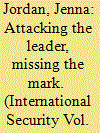

|
|
|
|
|
| Publication |
2014.
|
| Summary/Abstract |
Leadership targeting has become a key feature of counterterrorism policy. Both academics and policymakers have argued that the removal of leaders is an effective strategy in combating terrorism. Leadership decapitation is not always successful, however, and existing empirical work does not account for this variability. A theory of organizational resilience explains why decapitation results in the decline of some terrorist organizations and the survival of others. Organizational resilience is dependent on two variables: bureaucratization and communal support. Older and larger organizations tend to develop bureaucratic features, facilitating a clear succession process and increasing their stability and ability to withstand attacks on their leadership. Communal support plays an important role in providing the resources necessary for terrorist groups to function and survive. Religious and separatist groups typically enjoy a high degree of support from the communities in which they operate, and thus access to critical resources. Application of this theoretical model to the case of al-Qaida reveals that Osama bin Laden's death and the subsequent targeting of other high-level al-Qaida operatives are unlikely to produce significant organizational decline.
|
|
|
|
|
|
|
|
|
|
|
|
|
|
|
|
| 2 |
ID:
132961
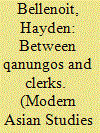

|
|
|
|
|
| Publication |
2014.
|
| Summary/Abstract |
This paper argues that our understanding of the transition to colonialism in South Asia can be enriched by examining the formation of revenue collection systems in north India between 1750 and 1850. It examines agrarian revenue systems not through the prism of legalism or landholding patterns, but by looking at the paper and record-based mechanisms by which wealth was actually extracted from India's hinterlands. It also examines the Kayastha pensmen who became an exponentially significant component of an Indo-Muslim revenue administration. They assisted the extension of Mughal revenue collection capabilities as qanungos (registrars) and patwaris (accountants). The intensity of revenue assessment, extraction and collection had increased by the mid 1700s, through the extension of cultivation and assessment by regional Indian kingdoms. The East India Company, in its agrarian revenue settlements in north India, utilized this extant revenue culture to push through savage revenue demands. These Kayastha pensmen thus furnished the 'young' Company with the crucial skills, physical records, and legitimacy to garner the agrarian wealth which would fund Britain's Indian empire. These more regular patterns of paper-oriented administration engendered a process of 'bureaucratization' and the emergence of the modern colonial state.
|
|
|
|
|
|
|
|
|
|
|
|
|
|
|
|
| 3 |
ID:
075002
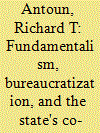

|
|
|
|
|
| Publication |
2006.
|
| Summary/Abstract |
In the Middle East over the past half-century, three religious processes have grown together. One, the growth of fundamentalism, has received worldwide attention both by academics and journalists. The others, the bureaucratization of religion and the state co-optation of religion, of equal duration but no less importance, have received much less attention. The bureaucratization of religion focuses on the hierarchicalization of religious specialists and state co-optation of religion focuses on their neutralization as political opponents. Few commentators link the three processes. In Jordan, fundamentalism, the bureaucratization of religion (BOR), and state co-optation of religion (SCR) have become entwined sometimes in mutually supportive and sometimes in antagonistic relations. The following case study will describe and analyze the implications of this mutual entanglement for the relations of state and civil society and for the human beings simultaneously bureaucratized and "fundamentalized."
|
|
|
|
|
|
|
|
|
|
|
|
|
|
|
|
| 4 |
ID:
178318
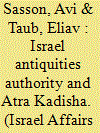

|
|
|
|
|
| Summary/Abstract |
Atra Kadisha is an ultra-Orthodox organisation that is at the forefront of the battle against excavation of ancient graves for fear of desecrating the dignity of the dead. This article examines the interrelationship between the organisation and the relevant state authorities, notably the Israel Antiquities Authority (IAA), in an attempt to ascertain the extent of bureaucratic rigidity/flexibility in Israel on the issue of excavating ancient graves, and to assess implications of this behaviour for the public space.
|
|
|
|
|
|
|
|
|
|
|
|
|
|
|
|
| 5 |
ID:
085403
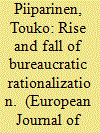

|
|
|
|
|
| Publication |
2008.
|
| Summary/Abstract |
If it is correct to say that the UN's policy has been dominated by great powers, then it is also true that the academic debate on the UN's failures in general, and the Rwandan tragedy in particular, has been dominated by an emphasis on Realpolitik , which has limited and precluded analysis of other possible causes of the UN's malfunctions. Power politics alone cannot fully explain why the downfall of `grand strategies' for the UN envisaged in Secretary-General Boutros Boutros-Ghali's An Agenda for Peace (1992), most notably conflict prevention, was almost as rapid as their emergence. By drawing upon new empirical evidence from interviews and by reflecting on theories of bureaucratization, this article explores one previously ignored mechanism underlying the failure of the Agenda in general and the Rwandan case in particular, namely bureaucratic rationalization.
|
|
|
|
|
|
|
|
|
|
|
|
|
|
|
|
| 6 |
ID:
006388


|
|
|
|
|
| Publication |
Cambridge, Polity Press, 1995.
|
| Description |
281p.Hbk
|
| Standard Number |
0745609430
|
|
|
|
|
|
|
|
|
|
|
|
Copies: C:1/I:0,R:0,Q:0
Circulation
| Accession# | Call# | Current Location | Status | Policy | Location |
| 038041 | 947.083/WEB 038041 | Main | On Shelf | General | |
|
|
|
|
| 7 |
ID:
105942
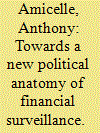

|
|
|
|
|
| Publication |
2011.
|
| Summary/Abstract |
This article examines dynamics of financial surveillance and risk-based regulation in the context of ongoing activities to combat money laundering and terrorist financing. Close analysis of the situation in the UK reveals entangled forms of co-regulation and ultimately co-production of surveillance that challenge 'institutional boundaries' of the state regarding policing and intelligence practices. It is argued that ongoing transformations in the anti-money laundering field reveal a dual movement that combines forms of indirect administration with a process of 'neoliberal bureaucratization'. The article aims to show how current policies against 'dirty money' still paradoxically work on the basis of heterogeneous goals and misapprehensions between 'professionals of security' and 'professionals of finance'.
|
|
|
|
|
|
|
|
|
|
|
|
|
|
|
|
|
|
|
|
|